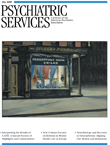Surprising Predictor of Rehospitalization
To the Editor: Recurrent readmission to inpatient psychiatric services is a vexatious problem for all involved in mental health services. Klinkenberg and Calsyn (
1 ) proposed system responsiveness as the most important element associated with high readmission rates. One approach to system responsiveness has been discharge planning. Caton and colleagues (
2 ) found that adequate discharge planning significantly influenced treatment adherence and rehospitalization in the first three months after an index hospitalization.
This letter describes an unexpected finding from a pilot study evaluating a discharge planning intervention for patients with a history of recurrent psychiatric hospitalization.
Patients who were hospitalized twice or more in the 18 months before an index hospitalization and who were 18 years of age or older, fluent in English, and able to give informed consent were invited to participate in the discharge planning study, which received approval from the local institutional review board. Thirty-one patients were enrolled during 2005–2006 and followed monthly for six months after discharge in order to determine their adherence to the treatment plans and to assess clinical outcome.
The treatment intervention was a discharge planning process that included providers from all agencies involved in the patient's care in the creation of a systematic plan to address major service domains—that is, food and shelter, case management, clinical care (both medication and psychological support), and psychosocial rehabilitation. Before discharge and at each follow-up, the patient's understanding of, agreement with, and motivation for three domains (case management, medication, and psychosocial rehabilitation) were rated on a 5-point Likert scale. Also assessed were the complexity of the patient's medication plan; the patient's level of expectation in regard to food, housing, and security; and the overall adequacy of the discharge plan. Assessments and ratings were carried out by research staff within two days of discharge.
Overall, 13 patients (42%) were readmitted within six months of the index hospitalization. Results of logistic regression showed that only patients' understanding of their case management plans predicted readmission. Patients who had a poor understanding of case management had nearly sevenfold higher odds of being readmitted within six months (Wald χ 2 =4.25, df=1, p=.03; odds ratio=6.86, 95% confidence interval=1.1–42.8). Poor understanding was rated by the research staff as failure to understand the purpose of case management and elements of case management.
This result raises an intriguing possibility that among patients with a history of recurrent hospitalization, cognitive understanding at discharge of a key component of follow-up treatment—case management—predicts rehospitalization within six months. Several elements of this finding surprised us. We expected that provisions in the treatment plan related to food, shelter, and security would be associated with psychiatric readmission, especially because many patients rated such arrangements as lacking, or that medication adherence would predict longer community tenure. That patients' understanding of case management—but not any other domain of discharge planning—predicted readmission raises the prospect that recently discharged individuals who may underestimate or minimize the importance of receiving help from others in the community because of a lack of cognitive understanding of case management are at greater risk of rehospitalization. We wonder whether this poor understanding of case management is related to the abstract nature of what this activity entails and thus signifies a deficit in neurocognition or whether these patients have a specific block against the idea of interpersonally oriented activities—a deficit that, regardless of cause, may not be fully appreciated by those treating them.

